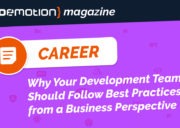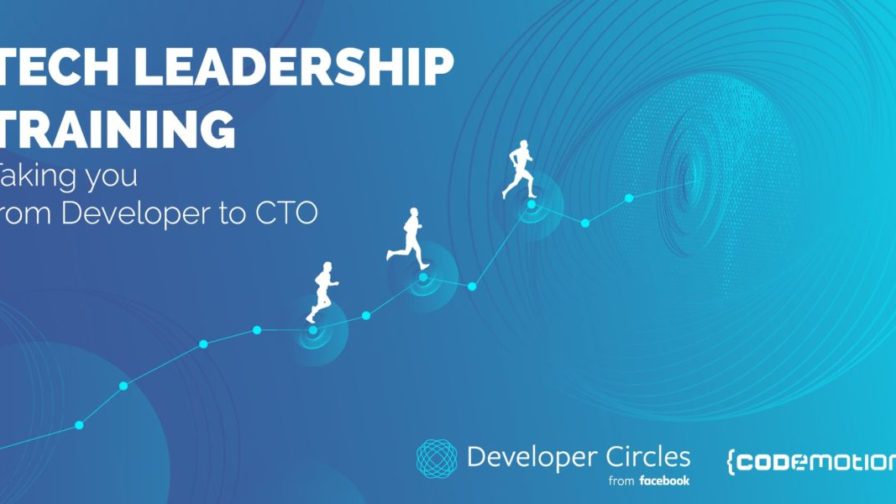
Rome, 22 June 2019: the boiling heat of the capital city was not enough to stop a bunch of tech professionals and enthusiasts – including me – from attending to Codemotion’s Tech Leadership Training boot camp. The event was the conclusive part of the Tech Leadership Training Course, sponsored by Facebook’s Developer Circles and preceded by the following modules:
- Module 1: Defining the CTO Role. An explorative journey through the CTO role, defining the main responsibilities and the frequent challenges that come with such a job.
- Module 2: AI/Machine Learning. A CTO-centric, strategical approach to the most innovative technologies for startups and companies nowadays.
- Module 3: Software Architecture/DevOps. An in-depth analysis of the DevOps methodology, focusing on the technical, cultural and business benefits that such an approach could bring to any software development team.
Having successfully attended (or completed online) the above modules was a requirement to get the boot camp invite: a unique chance for all developers, from the less experienced ones to those who are struggling to make the big shift from coders to decision-makers, to dive into a whole weekend of talks and workshops hosted by international IT professionals.
The Location
The event was set for June 22-23, 2019 at Codemotion’s headquarters in Rome, which is also the LUISS EnLabs & LVenture Group head office.
The Program
The boot camp consisted of two days of talks, debates, and workshops addressing a series of CTO-related topics: decision-making, business management, team management, product design, hiring skills and techniques, and so on.
It’s worth noting that all the talks have been held in English, which was kind of inevitable due to the massive presence of foreign speakers.
Day 1 – Saturday, June 22th
- 8:20 am: Check-in
- 9:00 am: Opening by Facebook
- 9:10 am: Opening by Codemotion
- 9:15 am: Talk by Codemotion: Data-Driven Decision especially in the CTO perspective, Andrea Saltarello, CTO @Managed Designs
- 10:30-10:40 am: Small Break
- 10:40 am: Talk by Codemotion: Business / financial management, Andrea Saltarello, CTO @Managed Designs
- 12:15 am: Talk by Codemotion: Tech Team Management (pt.1), Matteo Antony Mistretta, Founder @Inglorious Coderz
- 1:15-2:00 pm: Lunch break
- 00-4.30 pm: Talk by Codemotion: Tech Team Management (pt. 2), Matteo Antony Mistretta, Founder @Inglorious Coderz
Opening by Facebook
The first talk was hosted by Willie Elamien, Facebook Product Partnership Program Manager, who introduced us to Developer Circles: a new project specifically designed by Facebook to build a network of local and international developers and connect them to startups and companies from all around the world. In a nutshell, the program main goals are:
- Connect with other developers, thanks to exclusive accesses to local Facebook Groups, communities and meetups.
- Engage with local experts, since these groups and communities will be hosted and maintained by acknowledged technical leaders.
- Early access to new technologies, such as AI, Machine Learning, IoT and other development tools.
- Collaborate with other devs on the community projects that will eventually come to life.
Becoming part of the program will also be a great chance to find a job for those who are looking for a challenging career, and also a real-time hiring platform to find skilled coders, team leaders, and CTOs for established teams.
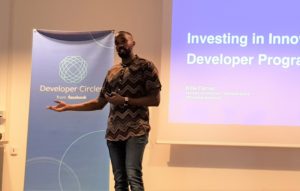
Further info about Facebook Developer Circles can be found by watching the video presentation or visiting the official program page.
Introduction by Codemotion
It was then the turn of Mara Marzocchi, co-founder and Chief Content Officer of Codemotion since 2011. After a quick recap of the whole Tech Leadership Training program, she presented the Codemotion events and initiatives roadmap for the upcoming months. She also announced the Codemotion Milan 2019 Tech Conference, which will be held on October 24-25, 2019.
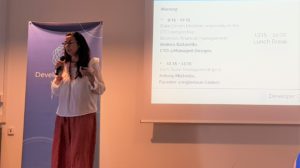
Data-Driven Decisions (from a CTO perspective)
The microphone then passed to Andrea Saltarello, Microsoft Regional Directors member and CTO at Managed Designs. He hosted a three-hour long talk focused on the CTO role, from the basic definition to the most distinctive aspects, talents, and skills.
Being able to rely on data-driven decision; becoming a translation layer between the stakeholders and the technical staff; understanding the value of knowledge investments to avoid being cut-out from present and future innovation opportunities; enforcing communication and feedbacks between people, both coming from same and different layers. Those were just some of the highly valuable concepts he managed to pull off.
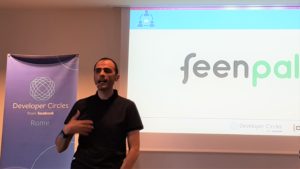
He then spent some time talking about feenpal, a project he designed together with a bunch of friends and colleagues: a real-life example that was very useful to properly understand the various decision-making tasks performed by a CTO during the whole lifecycle of a new IT product: plan, code, build, test, release, deploy, operate, and monitor.
I really liked how he emphasized the key role played by the other partners during each phase, from the executives (CEO, CIO, Marketing Manager) to the tech teams: by using a real-case scenario he helped the audience to better understand the importance of the full-scale communication and knowledge sharing he was referring to in the first part of his talk.
All in all, the session was great, stuffed with a lot of useful hints and valuable insights that can be definitely applied to startups and companies of any size: which is great, considering that most CTOs working outside Italy tend to share “recipes that could only be cooked” by big companies.
Business & Financial Management
After a small coffee break, Andrea switched to another CTO distinctive duty: Business & Financial Management, which also requires to train various skills that are often not included in a former developer’s toolbox: being able to precisely calculate the development time, which almost always requires timesheets and GANTT; reducing the task switching, since it has a tremendous cost (25 minutes per single switch) that most managers are not aware of; understanding the importance of a good business plan to effectively handle assets, budgets, risks, opportunities; and – most importantly – being able to calculate the TCO (Total Cost of Ownership), including hidden and potential costs – for example, the change management costs of a resource who chooses to leave or quit.
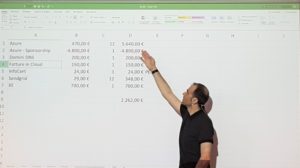
Tech Team Management
The last session was hosted by Matteo Anthony Mistretta, seasoned lead developer and founder of Inglorious Coderz. He led the audience to the lunch break by enumerating some important Tech Team Management concepts: from “being a leader, not a boss” to the utmost importance of metrics, being them the most effective way to properly measure and/or understand the various aspects that could affect the development team’s performance: technologies, developers, stakeholders and project/product design.
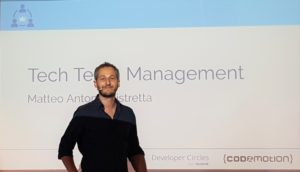
Matteo was able to do that giving a passionate, sincere and vibrating speech that could only come out from someone who has spent a good part of his life playing that role: I’m sure that most seasoned developers could not avoid empathizing with him and recollecting their own experiences, as they listened to him.
The second part of his talk was all about agile topics, such as eXtreme Programming (XP) best practices, from Test-Driven Development to Pair Programming, from continuous integration to constant refactoring, and so on.

